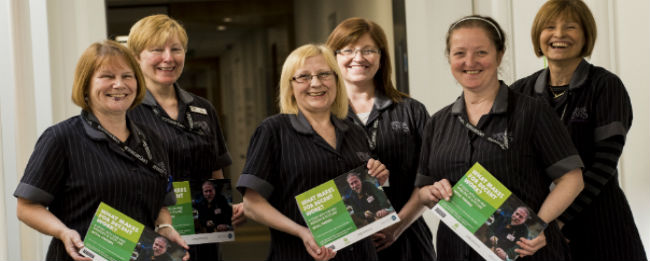By Suzanne Crimin, Special Projects Officer, Oxfam GB
Today is International Women’s Day – a time to celebrate women’s rights and the contribution of women in all parts of society. It’s also a time to reflect on how far we still have to go if we are to achieve gender equality.
Oxfam is an organisation with gender justice at its heart. We work to improve equality between women and men because the simple fact is that if you’re a woman, you’re more likely to live in poverty. Tackling gender inequality will help end poverty for everyone.
Shining a spotlight on gender inequality and working to tackle it is crucial in our work here in Scotland, just as it is in our programme work in more than 70 countries around the world.
In September 2016 we (with University of the West of Scotland) published ‘Decent work for Scotland’s low paid workers: a job to be done‘ – a report on research carried out with low-paid workers across Scotland on what ‘decent work’ means to them. The study focused on people with experience in low-wage – and female dominated – sectors such as social care, hospitality and cleaning.
Participants were asked to prioritise a total of 26 factors that make for decent work, resulting in the following top five priorities: a decent hourly rate, job security, paid leave, a safe working environment, and a supportive manager.
Throughout the consultation it became clear to me that for many of the participants these basic priorities were not being met. I admit this surprised me as I naively thought these things were already common practice in workplaces across Scotland. Given this isn’t always the case, it is worrying that the focus of policy makers is too often on increasing the number of people in employment rather than the quality of employment.
While there is a strong degree of consistency in the results, there are also gender differences. This is not surprising – given that women face greater barriers in gaining a foothold in the labour market, are more concentrated in low-paid sectors and occupations, and continue to be paid less than men for the same work.
|
Factors women value more |
Factors men value more |
|
A supportive line manager |
Being paid fairly compared to similar jobs |
|
Support to return to work after absence |
Regular and predictable hours |
|
Additional benefits beyond pay |
Work that does not involve excessive hours |
|
Flexibility in choosing working hours |
Being paid fairly compared to senior staff |
|
A job which is easy to get to |
Of course, a number of factors beyond gender impact and intersect on what people prioritise and the full report provides further breakdowns of findings by age, disability status, ethnicity/nationality, contract status, hours, status and trade union membership.
However, it seems likely that these headline gender differences reflect the barriers women face in participating in the labour market, such as the need to balance work with additional responsibilities beyond the workplace, including unpaid work such as care – which still disproportionately falls to women.
In contrast, expectations and gender norms based on the traditional ‘breadwinner model’, may explain, according to our research, men’s preferences for regular and predictable hours, but not excessive hours, as well as issues around fair pay.
Decent work is crucial to people’s lives. It is vital that not just politicians but all those with influence over the quality of work in Scotland – such as employers, trade unions, industry bodies, procurement professionals and others – engage in the debate and play their part to improve the lives of low-paid workers in Scotland today.
Women’s economic empowerment could reduce poverty for everyone. Read Oxfam International’s new report ‘An Economy That Works For Women‘, with recommendations for achieving women’s economic empowerment in an increasingly unequal world.
